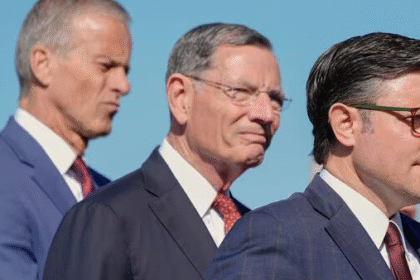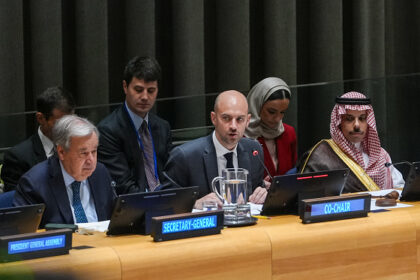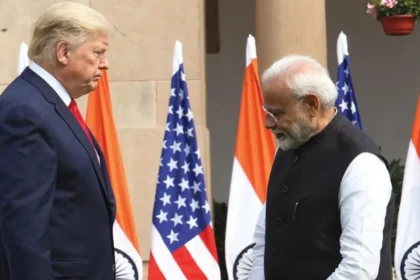Melania Trump Denies Viral Harvard Rumors About Son Barron Trump as ‘Completely False’
In the midst of a growing federal clampdown on Ivy League institutions led by the Trump administration, First Lady Melania Trump has spoken out to deny circulating rumors that her son, Barron Trump, was rejected by Harvard University. The First Lady, through her communications director Nicholas Clemens, categorically denied the viral speculation, stating that Barron never applied to the prestigious university.
“Barron did not apply to Harvard, and any assertion that he, or that anyone on his behalf, applied is completely false,” Clemens clarified in an official statement, putting to rest social media claims that the Trump family’s mounting grievances with elite colleges stemmed from a personal slight involving their youngest son.
White House vs. Ivy League
Since President Donald Trump returned to office in January, his administration has launched a series of aggressive measures targeting Ivy League universities, particularly Harvard and Columbia. These actions have come in response to the perceived rise of antisemitism on campuses, which the administration claims is being masked as support for pro-Palestinian movements.
The federal government has conditioned continued financial support for these institutions on the implementation of stricter campus policies. This has resulted in the cancellation of billions of dollars in federal grants for scientific research and academic programs.
Harvard University, often viewed as a liberal stronghold, has become the primary target of this federal offensive. The administration has criticized the university for what it describes as a lack of oversight regarding campus activities and its failure to adequately curb antisemitic rhetoric. President Trump himself labeled the institution a “hotbed of liberalism and antisemitism,” signaling a dramatic shift in how his administration views academic freedom in the current geopolitical climate.
Funding Cuts and Legal Battles
As part of the broader crackdown, the White House recently directed federal agencies to terminate contracts with Harvard worth approximately $100 million. These cancellations are just the latest in a string of financial penalties, which have already seen over $2.6 billion in research funding withdrawn from the institution.
This dramatic withdrawal of federal support has triggered a legal confrontation. On April 21, Harvard filed a lawsuit against the administration, challenging its efforts to alter the university’s leadership structure, governance rules, and admissions procedures. The Trump administration’s moves include pushing for new leadership policies that allegedly align more closely with its ideological stance on education and public funding.
Adding to the conflict, the administration has also moved to restrict Harvard’s ability to host international students by threatening its certification under the Student and Exchange Visitor Program (SEVP). This certification is vital for admitting students with F-1 and J-1 visas, who make up a significant portion of Harvard’s academic community.
Last Friday, a temporary restraining order was granted by U.S. District Judge Allison Burroughs, an Obama-era appointee, halting the administration’s attempt to revoke Harvard’s SEVP certification. This legal decision provides a brief reprieve but does little to resolve the wider conflict brewing between the executive branch and the nation’s most prominent university.
Strategic Escalation
Sources within the Trump administration suggest that the campaign against Ivy League schools will continue to escalate. Reports indicate that a letter will soon be sent to federal agencies instructing them to review all existing contracts with Harvard to determine whether they can be legally canceled or redirected to other institutions.
The administration’s move is widely viewed as part of a broader strategy to exert ideological control over elite academic institutions. Critics argue that such interventions threaten the independence of higher education and could damage the United States’ reputation as a global leader in research and innovation.
Online Speculation and Melania’s Intervention
The rumors involving Barron Trump emerged in the context of this heightened political conflict. Speculations across social media suggested that the Trump family’s grievances with Harvard may have been fueled by a personal rejection involving Barron’s alleged college application. These rumors quickly gained traction, spurred by the administration’s ongoing feud with the university.
Melania Trump’s timely statement served to quell the speculation and redirect attention to the broader issues at hand. By confirming that Barron never applied to Harvard, the First Lady made it clear that the administration’s conflict with the institution is not rooted in personal disappointment but is part of a larger political agenda.
Implications for Higher Education
The Trump administration’s aggressive posture toward Harvard and other Ivy League institutions could have far-reaching consequences for the future of higher education in the United States. By linking federal funding to political compliance, critics warn, the administration may be undermining core principles of academic freedom and institutional autonomy.
Moreover, the targeting of international students and research funding jeopardizes America’s global leadership in innovation and academia. Universities that rely on federal grants and international talent may find themselves struggling to maintain standards and attract top-tier students and faculty.
Conclusion
As Melania Trump refutes baseless rumors regarding her son Barron’s alleged Harvard application, the spotlight returns to the larger issue—President Trump’s sweeping actions against Ivy League institutions. With billions in funding at stake and the international academic community watching closely, the unfolding battle between the Trump administration and America’s top universities is far from over.








